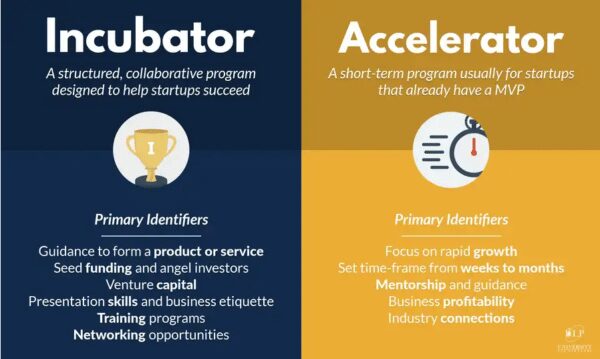Are you an entrepreneur looking to turn your startup idea into a successful business? If yes, then you may have heard of startup accelerators and incubators. These two programs offer support, resources, and funding to early-stage startups. While they share some similarities, they have distinct differences that can make one more suitable for your startup than the other.
Startup incubators are programs that help early-stage startups develop their ideas and turn them into viable businesses. They typically offer office space, mentorship, networking opportunities, and other resources to help entrepreneurs refine their business plans and strategies. Incubators may also provide funding through grants, loans, or non-dilutive financing.
On the other hand, startup accelerators are designed to help startups increase and scale their businesses. They typically offer a more structured program that includes mentorship, networking, educational resources, and seed investment in exchange for equity in the startup. Accelerators often focus on a specific industry or niche and may have a more competitive application process than incubators.
Defining Startup Accelerators and Incubators
Core Objectives
Startup accelerators and incubators are both programs designed to help early-stage startups succeed. The core objective of a startup accelerator is to help startups grow and scale their business quickly. Accelerators provide startups with access to funding, mentorship, and resources to help them achieve their goals.
The program usually lasts for a few months, during which startups work intensively with mentors and advisors to refine their business models, develop their products, and prepare for investment.
The core objective of a startup incubator is to help startups validate their business idea and develop their product. Incubators provide startups with a supportive environment to work on their business, access to resources, and mentorship. The program usually lasts longer than an accelerator, focusing on providing startups with the foundational support they need to succeed.

Key Differences
The main difference between a startup accelerator and an incubator is the stage of development they focus on. Accelerators typically work with startups with a minimum viable product (MVP) and are ready to scale their business. In contrast, incubators work with startups still in the idea validation stage and need help developing their product.
Another critical difference between the two programs is the intensity of the program. Accelerators are known for their fast-paced and intensive programs, which require startups to work long hours and make significant progress quickly. In comparison, incubators provide startups with a more relaxed environment, allowing them to work at their own pace and take the time they need to develop their product.
In summary, startup accelerators and incubators are valuable programs that can help early-stage startups succeed. The main difference between the two is the stage of development they focus on and the program’s intensity. If you have a startup with an MVP and are ready to scale quickly, an accelerator may be the right choice for you. However, an incubator may be better if you are still in the idea validation stage and need help developing your product.
Structural Components of Accelerators and Incubators
Understanding each program’s structural components is crucial when deciding between a startup accelerator and an incubator. Here are the key differences between the two types of programs:
Program Duration
Accelerators typically have a shorter program duration, lasting 3-6 months. During this time, startups receive intensive support to help them grow and scale their business. On the other hand, incubators offer longer-term support, often lasting up to 2 years. This allows startups to develop their business at a more gradual pace.
Mentorship and Networking
Both accelerators and incubators offer mentorship and networking opportunities, but the level of support can vary. Accelerators often provide hands-on mentorship and access to a broader network of industry experts and investors. Incubators focus more on creating a community of like-minded entrepreneurs, providing peer-to-peer mentorship and collaboration opportunities.
Funding and Investment Terms
Accelerators and incubators also differ in terms of funding and investment terms. Accelerators typically offer seed funding in exchange for equity in the startup. This investment is often made at the beginning of the program and is used to help the startup develop their product and scale their business. Incubators may provide funding through grants, loans, or non-dilutive financing.
When deciding between a startup accelerator and an incubator, it is essential to consider the program duration, mentorship and networking support level, and funding and investment terms.

Measuring Success in Accelerators and Incubators
Key metrics should be considered when measuring success in startup accelerators and incubators. These metrics can help you determine your program’s effectiveness and identify areas for improvement.
Success Metrics
One important metric to consider is your program’s success rate. This can be measured by looking at the percentage of startups that complete your program and go on to achieve their goals. You can also look at metrics such as revenue growth, job creation, and investment raised to gauge the overall success of your program.
Another essential metric to consider is the quality of the startups participating in your program. This can be measured by factors such as the startup’s stage, the quality of the team, and the growth potential. You can increase the likelihood of success for your program and create a more valuable experience for your participants by attracting high-quality startups,
Alumni Achievements
One way to measure the success of your program is to look at the achievements of your alums. Such metrics include the number of successful exits, the amount of funding raised, and the overall impact of the startups on their respective industries. This way, you can track the success of your alums and, as a result, demonstrate the value of your program to potential participants and investors.
It is important to remember that measuring success in startup accelerators and incubators can be challenging. Success can take many forms, and it’s essential to consider a range of metrics when evaluating your program. Focusing on the metrics that matter most to your program and your participants can create a more effective and valuable experience for everyone involved.

image source
Challenges and Considerations
When considering whether to join a startup accelerator or incubator, there are several challenges and considerations to remember. Here are two crucial factors to consider:
Selection and Competition
One of the biggest challenges you may face when applying to a startup accelerator or incubator is the competition. These programs are highly selective, and only a few applicants are accepted. As such, it’s essential to carefully research each program and tailor your application to fit their specific criteria.
To increase your chances of acceptance, consider networking with program alums or attending events hosted by the accelerator or incubator. You may also want to seek mentorship from successful entrepreneurs who have undergone similar programs.
Sustainability and Impact
Another important consideration is the program’s long-term sustainability and impact. While accelerators and incubators can provide valuable resources and mentorship, ensuring that the program aligns with your values and goals is essential.
Consider the program’s track record of success and approach to sustainability and social impact. Look for programs that prioritize diversity, equity, and inclusion and firmly commit to supporting underrepresented founders.
In conclusion, joining a startup accelerator or incubator should be based on careful research and considering your goals and values. Take time to evaluate your options and network with successful entrepreneurs. This will increase your chances of success and help you maximize your experience in these programs.
Key Takeaways:
- Startup incubators offer resources and support to early-stage startups, while accelerators focus on helping startups snowball and scale their businesses.
- Incubators may provide funding through grants, loans, or non-dilutive financing, while accelerators typically offer seed investment in exchange for equity in the startup.
- When deciding between an incubator and an accelerator, consider your startup’s stage of development, funding needs, time frame, and desired mentorship.
